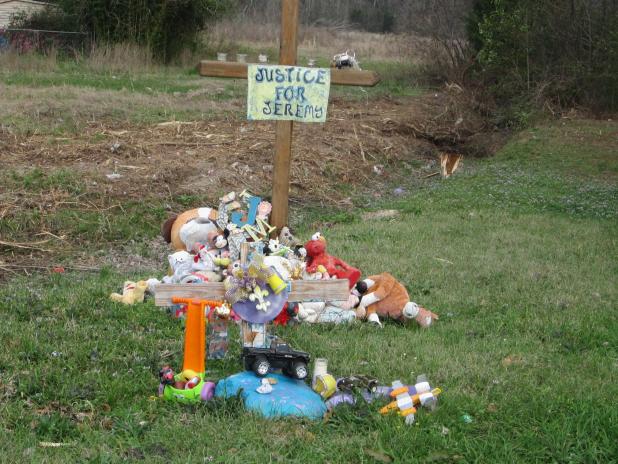
NOT FORGOTTEN
Almost 16 months have passed since 6-year-old Jeremy Mardis was killed in a hail of bullets fired into his father’s car by Marksville City Marshal’s deputies at the dead-end of Martin Luther King Dr. This memorial, at the entrance of the Marksville State Historic Site, was erected soon after the Nov. 3, 2015, incident that killed Jeremy and critically wounded his father, Chris Few.
Derrick Stafford and Norris Greenhouse Jr. are free on $1 million bond each while awaiting trial on charges of 2nd-degree murder and attempted 2nd-degree murder in that case. Stafford’s trial is scheduled for March 13. Greenhouse is set to go to trial on June 12. {Photo by Raymond L. Daye}
Motions to be heard Friday in Stafford case
A hearing on three prosecutor’s motions in the murder trial of Derrick Stafford is set for 1:30 p.m. Friday before 12th Judicial District Judge Billy Bennett.
Stafford is charged with 2nd degree murder and attempted 2nd degree murder in connection with a fatal traffic stop on Nov. 3, 2015 that left 6-year-old Jeremy Mardis dead and his father, Chris Few, critically wounded. His trial is currently set for March 13. Stafford and Norris Greenhhouse Jr. were on-duty as Ward 2/Marksville City Marshal’s deputies when they pursued Few to a dead-end on Martin Luther King Drive in Marksville.
The two men fired 18 rounds into Few’s vehicle as the car was stopped and Few had his hands raised and outside of the car’s driver’s side window.
JUROR CHALLENGES
Perhaps the most controversial motion is one Stafford’s attorney Chris LaCour said seeks to reduce the defense’s challenges to prospective jurors.
The legal term is to “implement simultaneous peremptory challenges,” which Assistant Attorney General Matthew Derbes said means the “state and defense challenges of the same prospective juror(s) would be considered an exercise of a challenge by both the state and the defense.”
LaCour said he and co-counsel Jonathan Goins want to be able to use their challenges “when we want to and on the jurors we want to.”
According to the motion, the 12th District Court’s rules allow for simultaneous peremptory challenges.
The defense attorneys want the court to follow Article 788 of the Code of Criminal Procedure, which states that a prospective juror is “tendered first to the state, which shall accept or challenge him. If the state accepts the prospective juror, he shall be tendered to the defendant, who shall accept or challenge him. When a prospective juror is accepted by the state and the defendant, he shall be sworn immediately as a juror.”
However, that provision also states that “if the court does not require tendering of jurors, it shall by local rule provide for a system of simultaneous exercise of challenges.”
Derbes pointed out that the 1st Circuit Court of Appeals in a previous case upheld a district court’s authority to allow simultaneous challenges. The appeals court ruled against the defendant’s argument that it “deprived him of the total number of peremptory challenges afforded to him by law because when a prospective juror was challenged by both the defense and the state, the challenge counted against both parties.”
EXPERT WITNESS
The other two motions deal with Stafford’s request for funds to pay for a “use of force expert” witness.
One of the motions asks for a formal hearing to determine the admissibility of that expert testimony. Derbes notes in his motion that the court must “ensure that any and all scientific testimony or evidence admitted is not only relevant, but reliable.”
The motion states that the “reliability of expert testimony is to be ensured by a requirement that there be ‘a valid connection to the pertinent inquiry as a pre-condition to admissibility.’” The prosecution contends a hearing on that issue is needed to determine whether the expert testimony satisfies the standards of admissible expert testimony.
The last motion asks the trial court to prevent the defense from “introducing opinion testimony as to guilt or innocence.”
LaCour said that motion is not needed because the defense does not plan to do that because it is already prohibited by court rules.
“The expert witness cannot testify as to guilt or innocence, and we would not attempt to have him do so,” LaCour said.
Derbes contends the defense attorneys’ plan to call a “use of force” expert is intended to support a claim that “the shooting of Few and his 6-year-old son was somehow justified under Louisiana law.”
The motion points out that Article 704 of the Code of Evidence “provides that in criminal cases, an expert witness shall not express an opinion as to the guilt or innocence of the accused.” The motion states that “every single statute that justifies the use of deadly force ultimately requires a reasonable belief that he or another person is in imminent danger of losing his life or receiving great bodily harm, AND that the killing is necessary to save himself or that other person from that danger.
“If a ‘use of force’ expert intends to give an opinion that Stafford met these requirements, that is tantamount to an opinion that the defendant is innocent of the crimes charged -- something the aforementioned case law expressly prohibits,” the motion continues. “The same holds true even if this expert were to couch this opinion in terms of a hypothetical situation.”
Derbes writes that “whether the determination as to whether Stafford’s killing of Jeremy Mardis and the attempted murder of Christopher Few were justified under the law is ultimately a decision for the trier of fact, not some ‘expert’ witness.”
